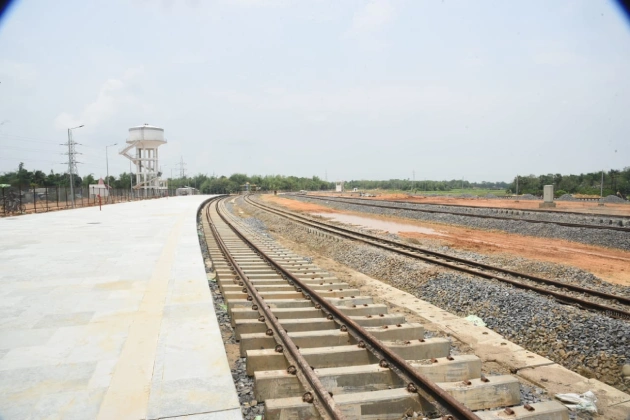

The Agartala Akhaura rail link is major spur connecting India and Bangladesh
Dhaka: India and Bangladesh are thinking big on multimodal connectivity- a move that not only be important for the two countries but would be key to sub-regional economic integration.
In fact, multimodal connectivity is no more a dream, as the two nations have stepped into heightened economic cooperation, which is gradually turning a vision into reality.
Once it takes-off, it will hugely benefit India’s landlocked northeast as it would open the pathway of rapid development.
Better connectivity will increase the value, resilience and dependability of the supply chains in the region.
To make the cooperation more energetic, the two countries have zeroed in on roads, water and railway connectivity. Several initiatives have been taken in the last few years, which are near completion.
Both Dhaka and Delhi underscore the enhancement of connectivity through air, water, rail, road will be mutually beneficial.
Last week, the High Commissioner of India to Bangladesh Pranay Verma at a seminar in Dhaka said that multimodal connectivity is the future of a new level of cooperation between the two countries.
The scope and quality of connectivity is a common aspiration, which reflects India’s growing partnership with Bangladesh, he remarked.
The envoy pointed out that the future links between the two countries would be shaped by multimodal connectivity, including through road and rail, inland waterways, coastal shipping, as well as energy and digital connectivity.
The High Commissioner said in the last five years, bilateral trade has more than doubled, and Bangladesh’s exports to India have now touched nearly USD 2 billion, with India emerging as the largest export market for Bangladesh in Asia.
Delhi has granted Duty-Free Quota Free access to all Bangladeshi goods except a few for a decade. Despite the trade balance being in India’s favour, many imported items help in adding value to Bangladeshi exports.
Already, the opening of the Mongla and Chattogram ports for the transhipment of goods to and from Indian north-eastern states to the rest of India was an important step.
Earlier the two countries had signed an agreement on coastal shipping in 2015 and an agreement in October 2018 on the use of Chattogram and Mongla Ports for trans-shipment of goods to and from India.
Bangladesh’s trade with its neighbours India, Nepal, and Bhutan has been on a positive trend over the last decade, writes Robart Shuvro Guda, Lead Economist of research think-tank Unnayan Shamannay.
The transportation connectivity will also connect Bhutan and Nepal with Bangladesh, according to a deal of BBIN MVA (Bangladesh, Bhutan, India and Nepal Motor Vehicle Agreement) which will optimise trade and commerce with the two landlocked countries.
Bangladesh, Bhutan, India, and Nepal agreed on the free movement of cargo and passenger vehicles in the sub-region. Unfortunately, Bhutan did not ratify the BBIN MVA citing environmental concerns, writes Robart Shuvro Guda.
Bhutan has raised the potential contribution to carbon footprint for which the picturesque country is known as the most environmental-friendly place in the world.
The threat to the environment from the vehicular movement of cargo would also cause damage to the road infrastructure, and likely to increase air pollution from the smoke from vehicles and non-recyclable waste generated from vehicular movements were the primary reasons for the pull-out of the agreement.
Once the connectivity is in full swing, the distance between Kolkata to Agartala via Dhaka in Bangladesh will be reduced by 1100 km compared to the typical route via Chicken’s Neck. Currently, only bus passengers are allowed to operate on the transit route.
With the opening of Hasina’s dream project, the Padma Bridge, the transports from Agartala and beyond will benefit from seamless connectivity. Similarly, the railroads over Padma Bridge and under construction Jamuna railway bridge will also make transportation hassle-free.
These two mix-modal routes are now available for connecting the rest of India with the northeast via Bangladesh. The Chattogram to Agartala land route will be connected via the Ramgarh-Subroom border crossing which will reduce the distance by 135 km.
The High Commissioner noted that as Bangladesh moves forward to make an important economic graduation to become a developing country in 2026, the negotiations for a Comprehensive Economic Partnership Agreement (CEPA) between India and Bangladesh would create a new institutional framework for leveraging the economic opportunities emanating from the transforming economies of both the countries.
Given the opportunity provided by the transition of Bangladesh into a developing country in 2026, India has decided to soon start negotiating on CEPA through which both countries can harness each other’s growing potential, said the Indian envoy.
It is well understood that the BIN MVA initiative will help to remove the hassle of transhipment at the India and Bangladesh border crossing points and trade time will be reduced significantly.
The envoy emphasised the long-term significance of connectivity in facilitating closer economic, cultural, and people-to-people ties between the two countries.
Verma remarked that Bangladesh sits on the cusp of India’s Act East Policy and Neighbourhood First policy for both of which connectivity is the core element.
Also Read: How Padma Rail Link in Bangladesh will become part of Trans-Asian Railway
Prime Minister Narendra Modi interacted with members of the Indian diaspora here on Wednesday as…
The city of Hamburg in Germany is set to host the 11th edition of India…
The International Atomic Energy Agency (IAEA) has confirmed that two Iranian centrifuge production facilities, TESA…
The human rights department of the Baloch National Movement (BNM), Paank, has strongly condemned the…
In a major boost to India's coastal defence capabilities, the Indian Navy on Wednesday commissioned…
Volker Turk, the UN High Commissioner for Human Rights, on June 17 expressed concern over…